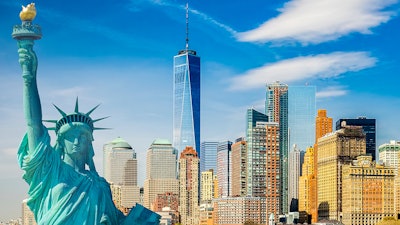
A New York lawmaker has introduced legislation to revamp the state’s medical cannabis program, in part by allowing out-of-state patients to shop at New York’s medical dispensaries.
Sen. Jeremy Cooney, D-Rochester, is sponsoring a bill that would not only provide reciprocity to nonresidents enrolled in other states’ medical cannabis programs, but would also allow patients to access prerolls, according to a Syracuse.com report.
Cooney told the news outlet that roughly a million out-of-state workers visit the state each day but cannot access medical cannabis in New York under current law.
His bill would remedy this, allowing certified medical cannabis patients from other states to purchase products from New York’s licensed medical dispensaries with documentation proving they are enrolled in another state’s medical cannabis program, Syracuse.com reported.
“New York is one of the most visited states in the country, from tourists to daily workers, so many non-New Yorkers utilize our state’s services,” Cooney told the news outlet. “Anyone who needs medical cannabis should be able to access it in New York if they’ve been approved in another state.”
New York’s medical cannabis operators—called registered organizations (ROs)—have been largely supportive of the legislation, claiming the proposal could help bolster the state’s medical cannabis program as patient enrollment gradually declines in the wake of New York launching commercial adult-use sales, Syracuse.com reported.
There were more than 151,000 certified medical cannabis patients in New York before lawmakers approved the state’s adult-use law in early 2021, according to the news outlet, but that number has since dropped to just over 120,400.
Cooney is also taking aim at medical cannabis policy reform with a separate bill this year that would repeal the 7% excise tax for medical cannabis products, Syracuse.com reported. He told the news outlet that bill is also meant to help retain patients in New York’s medical cannabis program.
“We can’t have a patient decide that it’s cheaper and easier to self-medicate using the retail market, or worse, the unregulated illicit market, when they should have easy access to high-quality, pharmaceutical-grade products,” Cooney said.
























